| Listing 1 - 10 of 11 | << page >> |
Sort by
|
Book
ISBN: 9789081433976 Year: 2013 Publisher: Brussel Demos
Abstract | Keywords | Export | Availability | Bookmark
 Loading...
Loading...Choose an application
- Reference Manager
- EndNote
- RefWorks (Direct export to RefWorks)
Vlaanderen kent tal van innovatieve sociale vrijetijdsinitiatieven. De ene keer ontstonden ze vanuit geëngageerde burgers, een andere keer uit het lokale middenveld of op initiatief van lokale overheden. We bundelden de inzichten uit deze initiatieven in een 4x4-formule: vier praktijken, vier figuren, vier participatieplekken en vier netwerken. We zochten naar evenwichtige aandacht voor de sectoren cultuur, jeugd, sport en de thema’s waarop dit boek focust: armoede, interculturaliteit, mensen met een beperking. In Buitenbenen praten we met professionals die dagdagelijks de link leggen tussen verschillende sectoren – de echte bruggenbouwers. We stappen af op plekken die veel ruimte laten aan partners om er zelf een dynamiek te ontwikkelen. We maken kennis met initiatieven en organisaties die van onderuit een werking opbouwden. Het komt erop neer om te verbinden en verknopen, om mensen uit kansengroepen mee te nemen in verhalen en contexten die even vertrouwd als stimulerend zijn.
Social policy and particular groups --- Sociology of leisure --- Institutions sociales --- Social institutions --- Sociale instellingen --- vrijetijdsbesteding --- Vrijetijdsbeleid --- Vrijetijdsbesteding (vakantie) --- 379 --- Vrijetijdsbesteding --- beleid --- Kansenongelijkheid --- Kansengroepen --- Cultuur --- Sport --- Jeugd --- Beleid --- Leisure --- Social aspects
Book
ISBN: 6076284846 Year: 1945 Publisher: El Colegio de México
Abstract | Keywords | Export | Availability | Bookmark
 Loading...
Loading...Choose an application
- Reference Manager
- EndNote
- RefWorks (Direct export to RefWorks)
Con esta serie de jornadas el Colegio de México presenta un amplio marco a la colaboración: desde las cuestiones filosóficas conexas hasta los estudios de las ciencias sociales más particular y especializada; pero viendo también dibujados dentro de ese marco estos propósitos fundamentales: 1. Exponer el estado actual de la ciencia, de conocimiento imprescindible, como punto de partida; 2 Examinar y discutir, en particular, los problemas peculiares de la ciencia en los países y 3. Contribuir en lo posible al desarrollo de la ciencia social en marcha
Sovereignty. --- Sovereignty --- State sovereignty (International relations) --- International law --- Political science --- Common heritage of mankind (International law) --- International relations --- Self-determination, National --- Law and legislation --- POLITICAL SCIENCE / General --- Groupes sociaux. --- Institutions sociales. --- Politics & government
Book
ISBN: 9780521518550 9780521178525 0521518555 9780511596605 051159660X 9780511596209 0511596200 0521178525 0511698801 1107191726 1282303066 9786612303067 0511593147 0511592213 0511595077 0511595808 Year: 2009 Publisher: Cambridge Cambridge university press
Abstract | Keywords | Export | Availability | Bookmark
 Loading...
Loading...Choose an application
- Reference Manager
- EndNote
- RefWorks (Direct export to RefWorks)
The 'institutional' approach to organizational research has shown how enduring features of social life - such as marriage and bureaucracy - act as mechanisms of social control. Such approaches have traditionally focused attention on the relationships between organizations and the fields in which they operate, providing strong accounts of the processes through which institutions govern action. In contrast, the study of institutional work reorients these traditional concerns, shifting the focus to understanding how action affects institutions. This book sets a research agenda within the field of institutional work by analyzing the ways in which individuals, groups, and organizations work to create, maintain, and disrupt the institutions that structure their lives. Through a series of essays and case studies, it explores the conceptual core of institutional work, identifies institutional work strategies, provides exemplars for future empirical research, and embeds the concept within broader sociological debates and ideas.
Institutions sociales --- Sociologie des organisations --- Normes sociales --- Structure sociale --- Sociologie du travail --- Comportement organisationnel --- Organizational sociology. --- Social institutions. --- 316 --- 65.01 --- organisatieleer --- sociologie, cultuur --- Sociologie --- Methods and methodology. Theory and practice of organization --- 65.01 Methods and methodology. Theory and practice of organization --- Organizational sociology --- Social institutions --- Institutions, Social --- Social systems --- Sociology --- Social structure --- Organization (Sociology) --- Organization theory --- Sociology of organizations --- Bureaucracy --- Institutions sociales. --- Sociologie des organisations. --- Normes sociales. --- Structure sociale. --- Sociologie du travail. --- Comportement organisationnel. --- Business, Economy and Management --- Business Management
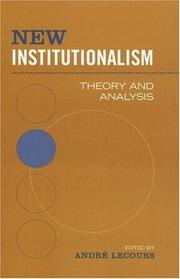
ISBN: 9780802048813 0802048811 0802039006 0802004393 9786612034008 1282034006 1442677635 9781442677630 9780802039002 9781282034006 6612034009 Year: 2005 Publisher: Toronto
Abstract | Keywords | Export | Availability | Bookmark
 Loading...
Loading...Choose an application
- Reference Manager
- EndNote
- RefWorks (Direct export to RefWorks)
"New institutionalism is one of the most influential approaches in contemporary political science. In this collection of essays, top scholars in the field offer important contributions to new institutionalist theory, engaging in debates about structure and agency, state-society relations, institutional creation and change, preference formation, and the complicated web of relationships between institutions, culture, ideas, identity, rationality, and interests. From an analytical point of view, the essays examine how the state and political institutions shape a variety of political phenomena and outcomes, namely, nationalism, democratic transition, party aggregation, policy networks, war and peace, international recognition, sovereignty, and specific public policies. One of the unique features of the book is that it offers institutionalist analysis in the sub-fields of political science: comparative politics, public policy, and international relations."--Jacket.
Political science --- Public institutions --- Social institutions --- Political sociology --- Science politique --- Etablissements publics --- Institutions sociales --- Sociologie politique --- Political science. --- Political sociology. --- Public institutions. --- Social institutions. --- Institutions sociales. --- Sociologie politique. --- Mass political behavior --- Political behavior --- Sociology --- Institutions, Social --- Social systems --- Social structure --- Government institutions --- Institutions, Public --- Institutions, State --- State institutions --- Associations, institutions, etc. --- Administration --- Civil government --- Commonwealth, The --- Government --- Political theory --- Political thought --- Politics --- Science, Political --- Social sciences --- State, The --- Sociological aspects --- Kanada. --- Kanada --- Canada --- Dominion of Canada --- Puissance du Canada --- Kanadier --- Provinz Kanada --- 01.07.1867 --- -Political science.

ISBN: 0585463840 9780585463841 1299784968 9781299784963 0742525589 9780742525580 0742525597 9780742525597 Year: 2003 Publisher: Lanham, Md. Rowman & Littlefield
Abstract | Keywords | Export | Availability | Bookmark
 Loading...
Loading...Choose an application
- Reference Manager
- EndNote
- RefWorks (Direct export to RefWorks)
In his newest book, leading social theorist Jonathan H. Turner offers a creative, richly grounded reinterpretation of social evolution.
Social evolution. --- Social institutions. --- Social evolution --- Social institutions --- #SBIB:316.21H10 --- #SBIB:316.334.2A500 --- 316.3 --- Institutions, Social --- Social systems --- Sociology --- Social structure --- Cultural evolution --- Cultural transformation --- Culture, Evolution of --- Culture --- Evolution --- Social change --- 316.3 Sociale structuur --(sociologie) --- Sociale structuur --(sociologie) --- Het functionalisme en systeemdenken in de theoretische sociologie --- Organisatiesociologie: algemeen --- Institutions sociales --- Evolution sociale
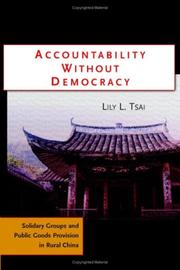
ISBN: 9780521871976 9780511800115 9780521692809 9780511355592 0511355599 0511354525 9780511354526 0511800118 0521871972 0521692806 9780511573699 0511573693 9780521897976 1107180546 0511355076 9786611153373 1281153370 0511353944 9780511976339 9780521723985 Year: 2011 Publisher: Cambridge Cambridge University Press
Abstract | Keywords | Export | Availability | Bookmark
 Loading...
Loading...Choose an application
- Reference Manager
- EndNote
- RefWorks (Direct export to RefWorks)
Examines the fundamental issue of how citizens get government officials to provide them with the roads, schools, and other public services they need by studying communities in rural China. In authoritarian and transitional systems, formal institutions for holding government officials accountable are often weak. The state often lacks sufficient resources to monitor its officials closely, and citizens are limited in their power to elect officials they believe will perform well and to remove them when they do not. The answer, Lily L. Tsai found, lies in a community's social institutions. Even when formal democratic and bureaucratic institutions of accountability are weak, government officials can still be subject to informal rules and norms created by community solidary groups that have earned high moral standing in the community.
S06/0225 --- S11/0558 --- S11/0497 --- S11/0484 --- China: Politics and government--People's Republic: local and provincial government: since 1976 --- China: Social sciences--Non-governmental organizations --- China: Social sciences--Society since 1976 --- China: Social sciences--Rural life, rural studies: since 1976 --- Municipal services --- Social institutions --- Institutions, Social --- Social systems --- Sociology --- Social structure --- Municipal services within corporate limits --- Public services --- Municipal government --- Public utilities --- China --- Rural conditions. --- Social Sciences --- Political Science --- Services municipaux --- Institutions sociales --- Chine --- Conditions rurales
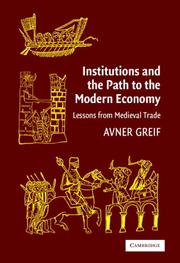
ISBN: 9780521671347 0521671345 0521480442 9780521480444 9780511791307 9780511345401 0511345402 0511791305 1107141532 1281108723 9786611108724 0511345089 0511344708 0511344317 0511555555 Year: 2006 Publisher: Cambridge Cambridge university press
Abstract | Keywords | Export | Availability | Bookmark
 Loading...
Loading...Choose an application
- Reference Manager
- EndNote
- RefWorks (Direct export to RefWorks)
It is widely believed that current disparities in economic, political, and social outcomes reflect distinct institutions. Institutions are invoked to explain why some countries are rich and others poor, some democratic and others dictatorial. But arguments of this sort gloss over the question of what institutions are, how they come about, and why they persist. They also fail to explain why institutions are influenced by the past, why it is that they can sometimes change, why they differ so much from society to society, and why it is hard to study them empirically and devise a policy aimed at altering them. This 2006 book seeks to overcome these problems, which have exercised economists, sociologists, political scientists, and a host of other researchers who use the social sciences to study history, law, and business administration. It presents a multi-disciplinary perspective to study endogenous institutions and their dynamics.
Economic order --- anno 500-1499 --- Commerce --- Social institutions. --- Institutions sociales --- History --- Histoire --- 339 <09> --- 338 <09> --- 330 --- AA / International- internationaal --- 321.2 --- 330.48 --- Handelsgeschiedenis --- Economische geschiedenis --- Theoretische economie. Economische theorie. Economische analyse --- Economisch beleid van de overheid. --- Neo-klassiekers en andere post-keynesiaanse theorieën. Public choice. Institutionalisten. Home economics. Analyseschool van de transactiekosten. --- 330 Theoretische economie. Economische theorie. Economische analyse --- 338 <09> Economische geschiedenis --- 339 <09> Handelsgeschiedenis --- Social institutions --- Institutions, Social --- Social systems --- Sociology --- Social structure --- Economisch beleid van de overheid --- Neo-klassiekers en andere post-keynesiaanse theorieën. Public choice. Institutionalisten. Home economics. Analyseschool van de transactiekosten --- Social Sciences --- Political Science
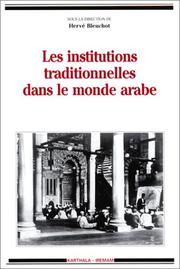
ISBN: 2865376397 2811146679 Year: 1996 Volume: *40 Publisher: Paris Karthala
Abstract | Keywords | Export | Availability | Bookmark
 Loading...
Loading...Choose an application
- Reference Manager
- EndNote
- RefWorks (Direct export to RefWorks)
On a souvent présenté les institutions du monde arabe sous des lumières très contrastées. On a ainsi décrit les institutions traditionnelles comme immobiles, acceptant la modernité à contre-coeur, incapables de correspondre aux besoins actuels, et donc condamnées à disparaître tôt ou tard devant des institutions modernes, puissantes et dynamiques. Ou, à l’inverse, on a décrit les anciennes comme toujours vivantes et hostiles au développement, les modernes n’étant que des paravents pour la propagande extérieure, des créations d’autant plus fragiles qu’elles seraient menacées par les projets de restauration de la loi islamique. Des lors la problématique tournait autour de la stagnation, du retour en arrière ou de l’affrontement avec la modernité. L’analyse concrète des situations repérées dans l’histoire ou dans la vie contemporaine fait vite douter de visions trop hâtives et trop polémiques. Cet ouvrage entreprend de retourner aux faits, de reprendre l’exploration plutôt que la discussion. En ouvrant les cadres disciplinaires et en diversifiant les problématiques, on suggère que la vie, la survie, la mort ou la résurrection des institutions traditionnelles peuvent être déployées sur les plans historique, juridique, économique, sociologue, etc., avec des problématiques diverses, mais les plus adaptées possibles à chaque institution : recherche des déterminants historiques de la destinée de l’institution, comparaison avec les institutions concurrentes, explicitation de la cohérence voulue par les législateurs en dialogue/opposition avec les « usagers » de l’institution, mise en évidence de la stratégie des acteurs dans le contexte politique ou sociologique. Cette étude se présente donc comme une moisson d’explorations concrètes dans les institutions du monde arabe, du Golfe à l’Atlantique, de l’école coranique aux universités, du travailleur immigré aux confréries politiques... Si elle indique l’impossibilité d’un maintien à l’identique des institutions…
Public institutions --- Religious institutions --- Social institutions --- Etablissements publics --- Institutions religieuses --- Institutions sociales --- Congresses --- Congrès --- Arab countries --- Etats arabes --- History --- Histoire --- #SBIB:39A4 --- #SBIB:39A11 --- 316.3 --- -Institutions, Social --- Social systems --- Sociology --- Social structure --- Toegepaste antropologie --- Antropologie : socio-politieke structuren en relaties --- Sociale structuur --(sociologie) --- Congresses. --- -Toegepaste antropologie --- 316.3 Sociale structuur --(sociologie) --- -316.3 Sociale structuur --(sociologie) --- Institutions, Social --- Congrès --- Politics and government --- Social life and customs --- Tunis --- Tunisie --- Le Caire --- monde arabe --- droit musulman --- Koweit (Kuwait) --- chūra --- kuttab --- Maroc --- kafāla --- hisba --- institutions traditionnelles
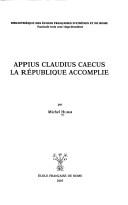
ISBN: 2728306826 2821820739 2728310262 9782728306824 Year: 2005 Volume: 322 Publisher: Rome Ecole française de Rome
Abstract | Keywords | Export | Availability | Bookmark
 Loading...
Loading...Choose an application
- Reference Manager
- EndNote
- RefWorks (Direct export to RefWorks)
En partant du rôle-clé joué par Appius Claudius Caecus, cette étude renouvelle la vision de l’histoire sociale, institutionnelle et culturelle de la Rome médio-républicaine (fin IVe – début IIIe siècle av. J.-C.). L’époque à laquelle se situe l’activité publique de ce personnage correspond en effet à un moment essentiel de l’histoire de la Rome républicaine, lorsque le vieux conflit patricio-plébéien cède la place à une forme de consensus politique qui s’est constitué autour des valeurs communes d’une nouvelle noblesse, née du partage des magistratures entre le patriciat et l’élite de la plèbe, et qui s’est renforcé avec les premiers pas de l’expansion romaine en Italie, notamment en direction de la Campanie. Au cours de cette époque cruciale, encore souvent négligée dans les études récentes sur l’Antiquité romaine, la République romaine a connu d’immenses bouleversements à la fois internes et externes qui ont en grande partie jeté les bases de son avenir. Dans ce contexte se placent les réformes institutionnelles de la censure de 312, rendues si confuses par les multiples interprétations des Anciens et des Modernes. Cet ouvrage montre l’unité d’ensemble de ces réformes qui ont conduit à la réorganisation civique du peuple romain et de son aristocratie (équestre et sénatoriale) selon les principes de l’égalité géométrique. Depuis B. G. Niebuhr et Th. Mommsen, on considère généralement que le célèbre censeur a joué un rôle important dans l’introduction de l’hellénisme à Rome : dans quelle mesure la présence et l’influence de l’hellénisme en Italie ont-elles pu fournir des modèles culturels ou idéologiques aux réformes alors entreprises ? Appius Claudius Caecus peut ainsi devenir le point de départ d’une réflexion d’ensemble sur les institutions, la société et l’univers culturel de Rome à l’époque « médio-républicaine », et de cette manière fournir, entre les origines semi-légendaires du régime républicain et l’époque mieux connue de la République finissante, le «…
Statesmen --- Hommes d'Etat --- Claudius Caecus, App. --- Rome --- History --- Histoire --- Politics and government --- Censors, Roman --- Consuls, Roman --- Caecus, App. Claudius --- App. Claudius Caecus --- Claudius Caecus, Ap. --- Claudio Cieco, Appio --- Cieco, Appio Claudio --- Claudius Caecus, App. (Appius) --- Censors [Roman ] --- Biography --- Consuls [Roman] --- Republic, 510-265 B.C. --- 510-30 B.C. --- Rome - Politics and government - 265-30 B.C. --- Athènes --- magistrature --- temples --- droit romain --- littérature --- divinités --- monnaie --- hellénisme --- Capoue --- commices --- peintures funéraires --- pythagorisme --- République --- armée --- Italie du Sud --- société romaine --- Tarente --- alliances --- tribus --- nobilitas --- Claudius caecus, appius (ive-iiie s. av. j. c.) --- Institutions politiques --- Institutions sociales --- 4e siècle av. j.-c.

ISBN: 9004138803 9789004138803 9786610915224 9047405447 1280915226 1429408111 9781429408110 9781280915222 6610915229 9789047405443 Year: 2004 Volume: 20 Publisher: Leiden;Boston BRILL
Abstract | Keywords | Export | Availability | Bookmark
 Loading...
Loading...Choose an application
- Reference Manager
- EndNote
- RefWorks (Direct export to RefWorks)
This volume offers new insights into the self-perceptions, strategies, and rituals through which early modern institutions functioned. Its wide range and its comparative vision of the nature of institutions prompts a new interpretation of the role of institutions in society. With contributions by Florence Hsia, Ian Anders Gadd, Gayle K. Brunelle, Christopher Carlsmith, Susan E. Brown, Victor Morgan, Steve Hindle, Janelle Day Jenstad, Eve Rosenhaft, Reed Benhamou, James Shaw, Kristine Haugen.
Social institutions --- Civilization, Medieval. --- History. --- Europe --- Social life and customs. --- History --- Beschaving [Middeleeuwse ] --- Civilisation médiévale --- Civilization [Medieval ] --- Civilization [Medieval ]--History --- Europa--Beschaving--476-1492 --- Europe--Civilisation--476-1492 --- Europe--Civilization--476-1492 --- Medieval civilization --- Middeleeuwen--Beschaving --- Middeleeuwen--Cultuur --- Middeleeuwse beschaving --- Middeleeuwse cultuur --- Middle Ages--Civilization --- Moyen-Age--Civilisation --- Civilization, Medieval --- Institutions, Social --- Social systems --- Sociology --- Social structure --- Middle Ages --- Civilization --- Chivalry --- Renaissance --- Social life and customs --- 476-1492 --- 1492 --- -Social institutions --- -Civilization, Medieval --- -Social institutions - History. --- Social institutions - Europe - History. --- Europe - Social life and customs. --- Europe - History - 476-1492. --- Europe - History - 1492 --- Social institutions - History. --- Institutions sociales --- Moyen âge --- Moeurs et coutumes --- 1492-....
| Listing 1 - 10 of 11 | << page >> |
Sort by
|

 Search
Search Feedback
Feedback About UniCat
About UniCat  Help
Help News
News